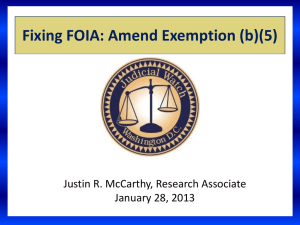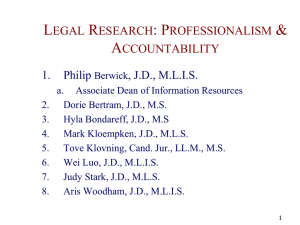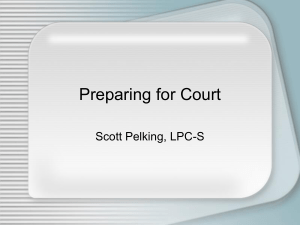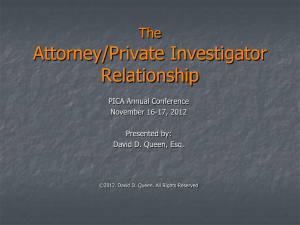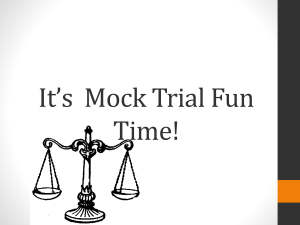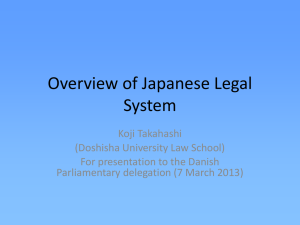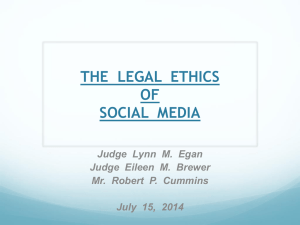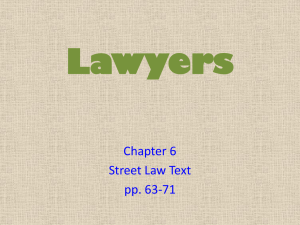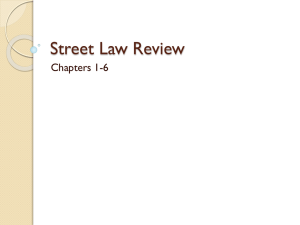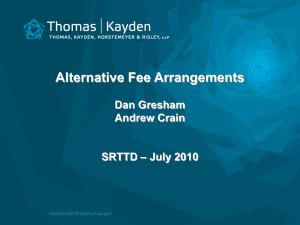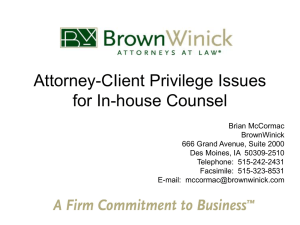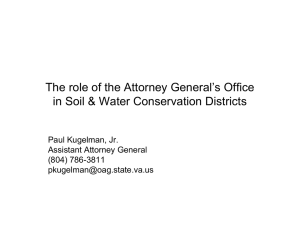Here - Feldesman Tucker Leifer Fidell LLP
advertisement
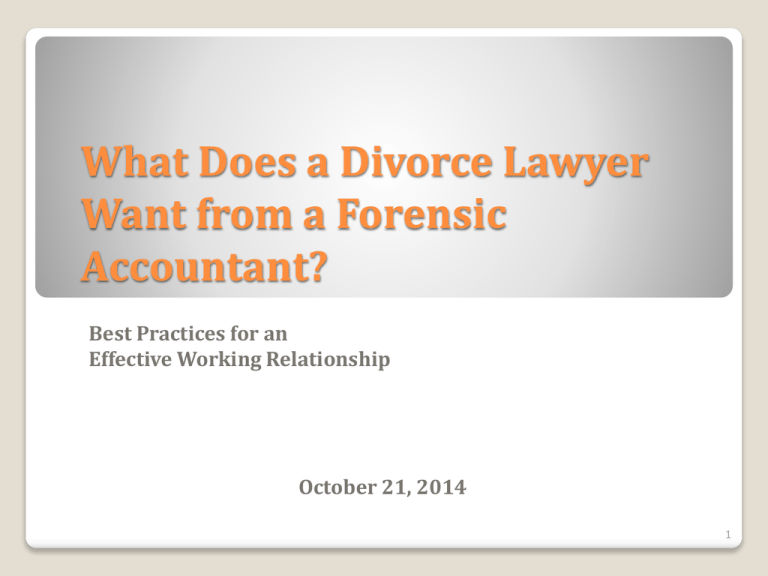
What Does a Divorce Lawyer Want from a Forensic Accountant? Best Practices for an Effective Working Relationship October 21, 2014 1 Feldesman Tucker Leifer Fidell LLP Washington, D.C. Mary S. Pence Jason N. Sposeep Schiller DuCanto & Fleck LLP Chicago Shirley M. Steinbach Feldesman Tucker Leifer Fidell LLP Washington, D.C. 2 What is at stake? 3 The best outcome for the client 4 Reputations 5 Malpractice Exposure 6 Attorneys and Forensic Accountants have different training and mindsets 7 The key is for the professionals to have each other’s backs. 8 Central Concepts 9 Responsiveness, timing, being forward looking 10 Clarity about strengths and weaknesses 11 Good communication 12 Division of responsibility 13 Fitting into the attorney’s mindset 14 Types of Engagements in Family Law Cases 1. Strategy 2. Investigation 3. Valuations 4. Determination of Income 5. Cash Flow/support 6. Tracing of Marital and Non-marital Assets 7. Tax Projections 15 Engagement to Develop Strategy 1. Understand the attorney’s theory of the case/assist in its evolution 2. Understand the client’s goals and objectives 3. Mastery of the facts/documents 16 Investigation Engagement 1. Understand the attorney’s theory of the case 2. Establish scope of work 3. Establish priorities and time frames 17 Possible Areas of Investigation 1. Hidden assets: a) b) c) d) Examine corporate and personal tax returns Examine personal and corporate bank statements and corporate detailed general ledger. Obtain SEC filings Review databases regarding real estate and corporate entities 2. Income Issues: a) b) Personal expenses disguised as business expenses Employment-related perquisites 18 Valuation Engagement 1. 2. 3. 4. 5. 6. 7. 8. Know the law in the relevant jurisdiction Disclose prior relevant experience or lack thereof Develop information about the opposing expert, if any Develop information about ethical constraints of opposing expert Disclose your own prior expert opinions which may create a conflict or constraint with regard to your expert opinion in this matter If the case is in litigation, communicate with the attorney about discovery deadlines – i.e., designation of experts, production of reports, deposition and trial dates Plan ahead to preserve the work product privilege Arrange for direct contact with the client to glean relevant information 19 Determination of Income 1. Review relevant statutory and case law defining income 2. Understand the attorney’s theory of the case 3. Educate the attorney as needed 4. Plan for the organization and presentation of conclusions 20 21 22 Cash Flow/Support Engagement 1. Understand the attorney’s theory of the case 2. Clarify division of responsibility: • Who will prepare the client’s detailed expense statement • How will results be presented? • How will tax ramifications be included? 3. Decide how results will be presented 23 24 Tracing of Marital and Non-Marital Assets 1. Review statutory and case law definitions 2. Be in close communication with the attorney as information is produced/developed 3. Develop information about the opposing expert 4. Develop information about the ethical constraints of opposing expert 5. Disclose your own prior expert opinions which may create a conflict or constraint with regard to your expert opinion in this matter 6. If the case is in litigation, communicate with the attorney about discovery deadlines – i.e., designation of experts, production of reports, depositions and trial dates 7. Plan ahead to preserve the work product privilege 8. Agree on how conclusions will be presented 25 Establishing Dissipation 1. Understand the applicable statutory and case law 2. With the attorney, develop the theory regarding dissipation, including possible alternative theories 3. Develop settlement/court exhibits 4. Be mindful of evidentiary rules for introduction into evidence 26 Examples of Establishing Dissipation: ◦ Spending on a paramour ◦ Gambling/addiction expenditures ◦ Unusual luxury expenditures ◦ Pre-payment of rental/lease expenditures ◦ Excess estimated tax payments 27 Tax Projections and Opinions 1. Be knowledgeable about the relevant tax law, or associate with an expert in a particular specialty if needed in the relevant jurisdiction 2. With the attorney, decide how many and which scenarios will be created 28 29 30 Accountant-Drafted Document Requests Provide the invoices or other supporting documents (including “yellow sheets”) for all “personal expenses” charged to Mr. Helfer’s capital account from 1/1/2009 to the present. Provide the general ledger entries reflecting all “personal expenses” charged to Mr. Helfer’s capital account from 1/1/2009 to the present. Provide copies of canceled checks used as payment for “personal expenses” charged to Mr. Helfer’s capital account from 1/1/2009 to the present. 31 Attorney-Drafted Document Requests Produce all documents relating or referring to personal expenses that are paid for you or reimbursed to you by Ginsberg Helfer & Boyd, PLLC since the date of the marriage, including invoices, “yellow sheets,” general ledger entries, and cancelled checks. This Request includes but is not limited to all documents relating or referring to the line item for “Personal Expenses” on the periodic Memoranda you receive from Ginsberg Helfer & Boyd, PLLC on the subject of your draws, a copy of which is attached as Exhibit A. 32 Practice Pointers (for Cooperating to Obtain Information Necessary for Analysis) Bemindful of important discovery dates ◦ ◦ ◦ ◦ How soon can we serve discovery? When will responses to document requests and interrogatories be received from the other side? When is the cut-off date for serving discovery requests? When will the key persons be deposed? Consult early in the engagement Consult often throughout the engagement 33 Discovery is a Two-Way Street! 34 Discovery Requests from Opposing Party Produce all your expert witnesses’ written communications, including emails, that relate to this lawsuit. Produce all documents prepared by your expert witness in the context of this litigation, including all drafts of reports. Produce all documents provided to your expert witness in the context of the litigation. 35 Attorney-Client Privilege The attorney-client privilege attaches to direct communication between a client and their attorney, as well as communications made through their respective agents. Reed Dairy Farm v. Consumers Power Co., 227 Mich. App. 614, 618, 576 N.W.2d 709, 711 (1998). 36 The Facts of People v. Marcy Defendant was charged with murder. Defendant’s attorney asked an expert to conduct a polygraph examination of Defendant. Prosecution requested that the expert reveal all the information in his possession regarding the murder. The expert refused on the grounds of attorney-client privilege. How did the Court rule? See 91 Mich. App. 399, 283 N.W.2d 754 (1979). 37 The Ruling in People v. Marcy [C]ommunications between [the defendant] and [the expert] are protected by the attorney-client privilege. . . . the attorney-client privilege has been extended to cover, inter alia, an accountant, investigator, engineer or appraiser employed by either the client or the attorney to assist the attorney. . . [T]he assistance of experts is often required in preparing a case for trial, and the participation of an expert in trial preparation often makes him, in effect, “assistant counsel . . . We agree with the trial court that the attorney-client privilege extends to the polygraph examination conducted by [the expert] at the request of [the defendant‘s] attorney.” 91 Mich. App. 399, 406-07, 283 N.W.2d 754, 757 (1979) (internal citations and quotations omitted). Cf. Ill. S. Ct. R. 201(b)(3); D. C. Superior Court Domestic Relations Rule 26(b)(4)(B); Michigan Court Rule 2.302(B)(4)(b). 38 The Facts of Meany v. Am. Cas. Co. of Reading Product liability action. Plaintiff was electrocuted upon operating a machine made by Defendant Altec. Altec hired Dr. Chard to inspect its machine. Dr. Chard prepared an Initial Report and provided it to the Altec’s attorney. Later, Altec designated Dr. Chard as a testifying expert and produced his formal expert report Altec refused to produce Dr. Chard’s Initial Report under claims of attorney-client privilege. Plaintiff moved to compel. How did the Court rule? See 3:11-CV-401-S, 2013 WL 3154958 (W.D. Ky. June 19, 2013). 39 The Ruling in Meany v. Am. Cas. Co. of Reading “[C]onfidentiality implies that the information will not be used to form the basis of expert testimony at trial; this is because expert testimony must be cross-examinable. . . A distinction must be drawn between an expert hired to testify at trial and an expert consulted as an adviser who will not testify. The first is a witness who . . . does not fall in the definition of representative of lawyer. In this situation disclosure is contemplated and the privilege is eliminated . . . Altec has waived any attorney-client privilege it may have had with respect to the Initial Report.” 2013 WL 3154958 (W.D. Ky. June 19, 2013) (internal citations and quotations omitted); see also People v. Wagener, 196 Ill. 2d 269, 275, 752 N.E.2d 430, 435 (2001) (communications between defendant and his expert are attorney-client privileged only so long as expert will not testify). 40 Work-Product Protection The work product doctrine . . . is designed to protect the right of an attorney to thoroughly prepare his case and to preclude a less diligent adversary attorney from taking undue advantage of the former's efforts. Fischel & Kahn, Ltd. v. van Straaten Gallery, Inc., 189 Ill. 2d 579, 591, 727 N.E.2d 240, 246 (2000) (citing Hickman v. Taylor, 329 U.S. 495 (1947)). 41 Work-Product Protection – Broad Iteration A party may obtain discovery of documents and tangible things that are relevant, and not privileged, and were prepared in anticipation of litigation or for trial only upon a showing that the party seeking discovery has substantial need of the materials and that the party is unable without undue hardship to obtain the substantial equivalent of the materials by other means. See Superior Court Domestic Relations Rules 26(b)(3); Michigan Court Rule 2.302(B)(3) (substantially similar). 42 Work-Product Protection – Broad “Substantial need and inability without undue hardship to obtain the substantial equivalent.” See, e.g., In re Terra Int’l, Inc. 134 F.3d 302, 305 (5th Cir. 1998) (requiring disclosure of consulting expert’s report detailing condition of explosion site because site changed over time); Delcastor, Inc. v. Vail Assocs, 108 F.R.D. 405, 408-09 (D. Colo. 1985) (requiring disclosure of testifying expert’s report where expert investigated site the morning after a mudslide, and weather and human activities altered the terrain before plaintiff’s expert could examine the site). 43 Work-Product Protection – Broad Discovery of facts known and opinions held by an expert, otherwise relevant and not privileged, and acquired or developed in anticipation of litigation or for trial, may be obtained only as follows: (i) A party may through interrogatories require any other party to identify each person whom the other party expects to call as an expert witness at trial, to state the subject matter on which the expert is expected to testify, and to state the substance of the facts and opinions to which the expert is expected to testify and a summary of the grounds for each opinion. (ii) A party may by deposition require a person whom any other party expects to call as an expert witness at trial to state the substance of the facts and opinions to which the expert is expected to testify and the grounds for each opinion. (iii) Upon motion . . . Superior Court Domestic Relations Rules 26(b)(4); see also Michigan Court Rule 2.302(B)(4) (substantially similar) 44 Work-Product Protection – Broad As MCR 2.302(B)(4) recognizes, the facts known and opinions held by an expert are not work product. Those facts and opinions are subject to discovery by means of interrogatories, deposition, and further discovery ordered by the court. The arrangement of those facts and opinions in a report, made directly responsive to the inquiries of an attorney, is, however, work product; a disclosure of the report itself would betray those thoughts, mental impressions, formulations of litigation strategy, and legal theories of the attorney that are protected by the work-product doctrine. To hold that a party to a litigation could attain copies of those reports by merely making a demand for production without more would have the practical effect of chilling the ability of an attorney and his retained expert witness to freely communicate in writing. Backiel v. Sinai Hosp. of Detroit, 163 Mich. App. 774, 778, 415 N.W.2d 15, 17 (1987) 45 Work-Product Protection – Narrow Material prepared by or for a party in preparation for trial is subject to discovery only if it does not contain or disclose the theories, mental impressions, or litigation plans of the party’s attorney. Illinois Supreme Court Rule 201(b)(2) (emphasis supplied); see also Shields v. Burlington N. & Santa Fe Ry. Co., 353 Ill. App. 3d 506, 508-09, 818 N.E.2d 851, 853 (2004) (“Our supreme court . . . deliberately narrowed the scope of the protection”); Jackson ex rel. Jackson v. Reid, 402 Ill. App. 3d 215, 234, 935 N.E.2d 978, 994 (2010) (“The work product rule protects documents prepared by counsel. Here, the articles, which plaintiffs' counsel sought to discuss during cross-examination, were not prepared by defense counsel. Thus, work product rule does not apply.”) (emphasis original). 46 Work-Product Protection – Narrow For each testifying expert who is retained in anticipation of litigation: The party must identify: (i) the subject matter on which the witness will testify; (ii) the conclusions and opinions of the witness and the bases therefor; (iii) the qualifications of the witness; and (iv) any reports prepared by the witness about the case. Illinois Supreme Court Rule 213(f)(3). 47 Summary: Am I required to respond to the discovery requests? Consulting Experts – Generally (but not always) protected from discovery. Testifying Experts – Certain work product may be protected if prepared in anticipation of litigation depending on the law of the forum. 48 Practice Pointers For Consulting Experts Think twice before changing roles from a consulting expert to a testifying expert. Work under the assumption that the privilege will be waived (because you may ultimately be designated as a testifying expert). Communicate verbally with the attorney and client whenever possible, as opposed to in writing. Doing so will at least minimize the burden to produce documents. 49 Practice Pointers For Testifying Experts Know the law of the forum on the subject of workproduct Especially if you’re in a jurisdiction that uses a narrow iteration of the doctrine, be mindful of the documents you create and what you put in writing Beware if you are testifying on behalf of a client regarding work you did for that client when litigation was not anticipated because the doctrine does not apply in that context 50 © 2014 This information is not intended to constitute legal advice and should not be relied upon in lieu of consultation with appropriate legal advisors in your own jurisdiction. 51
